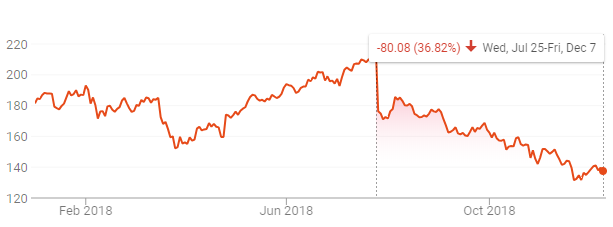Facebook hit with Italian fine as share buy-back ramps up
The Italian watchdog is the latest to slap a fine on Facebook for misleading and abusing consumer confidence.
December 10, 2018

The Italian watchdog is the latest to slap a fine on Facebook for misleading and abusing consumer confidence.
The Autorità Garante della Concorrenza e del Mercato (AGCM) has imposed a €10 million fine on Facebook after a lengthy investigation which begin in April. The watchdog has come to the conclusion the social media giant has violated articles 21 and 22 of the Consumer Code, misleading the consumer on how data would be collected, what information would be sourced and the commercial purpose.
To rub salt into the wounds, the AGCM also believes articles 24 and 25 of the Consumer Code were also ignored. These violations are a bit more nefarious as the AGCM has stated Facebook implemented an aggressive practice as it “exerts undue influence on registered consumers, who suffer, without express and prior consent”. A rather devilish picture is being painted by the Italian watchdog, with Facebook portrayed as the antagonist of a fair and transparent society.
For Facebook, this is simply another example of a government turning against it. It wasn’t that long-ago Facebook was a business every government wanted to get into the good books of and a brand which was admired by the majority of consumers. The Cambridge Analytica scandal has sent the reputation of the social media giant into freefall, pulling back the curtain on the terrifying complexities of the data economy. The difference between how the machine functions and how these billionaires have educated the masses who provide the fuel is quite staggering.
Despite the world turning against Facebook, it seems the management team is embracing the phrase ‘no such thing as bad publicity’.
Last week, an 8-K filing was made by David Kling, Facebook’s General Counsel and Secretary, to the Security and Exchange Commission, which authorises an additional $9 billion in the share buy-back scheme which commenced in 2017. This is the second time the management team has bolstered the chest, taking advantage of a decline in share price to seemingly take back more control of the business from investors.

As you can see from the image above (courtesy of Google Finance), Facebook share price has fallen by almost 37% since the summer, as the fallout of the Cambridge Analytica continues to scare investors. The management team clearly believe Facebook shares are being undervalued by the market, pumping cash into the share buy-back scheme perhaps to dilute the influence external shareholders can have on the business.
There are of course numerous reasons a company would repurchase shares. It might believe there is simply too much exposure on the market, it might be trying to reduce the influence on the business from external factors or it might not know what else to do with the free cash which it has available.
With Facebook increasingly coming under scrutiny by regulators and governments, it makes sense the management team want fewer shares on the exchanges. This minimises the damage which can be struck by negative press and unfavourable regulations, but also reduces the scrutiny which can be placed on decisions and future strategies. The management team have been under pressure recently for, what the market believes are, poor growth prospects.
However, there is a downside. Sometimes investors might consider the ramping up of a share buy-back scheme as a lack of ideas from the firm. Firstly, it is trying to protect itself for future earning calls, and secondly, it perhaps indicates the business does not know what to do with free cash, of which Facebook has a lot of.
Facebook has not been an innovative company for some years now. Most of the ‘new’ products and services introduced by the team are reinventions of something which already exists with the Facebook brand slapped on (marketplace, enterprise communications etc.), or are a blatant rip-off of a competitor’s idea. The Stories feature on Facebook and Instagram is clearly an imitation of the My Story feature on Snapchat. Some believe share buy-back programmes are evidence a firm has run out of new ideas.
Facebook is increasingly coming under pressure from consumers, governments, regulators and investors, though little is being done to reverse this trend. Posters have been displayed across the major cities promising the consumer it does care, and while executives have been meeting with governments, the answers being provided are increasingly unsatisfactory. The release of 250 Facebook emails and memos by the UK government has shed further light on the deception, though the response has been on par with Facebook’s form.
It’s almost like Zuckerberg and his cronies don’t care anymore. Instagram seems to be offsetting (at least partially) the decline in engagement on the Facebook platform, so there are still prospects to participate in the digital economy. The image of the company which is being created right now is one of arrogance. Facebook seems to think it is untouchable, and perhaps €10 million fine demonstrates it is.
How long will it take Mark to pay off this fine? Is Facebook actually going to be held accountable for wrong-doing?
About the Author
You May Also Like










.png?width=300&auto=webp&quality=80&disable=upscale)


_1.jpg?width=300&auto=webp&quality=80&disable=upscale)